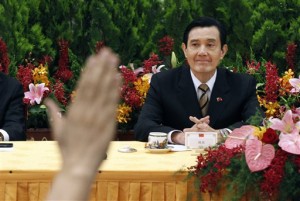Taiwan president takes office amid protests

Taiwan's President Ma Ying-jeou takes questions during a press briefing to international media after his inauguration ceremony at the Presidential Building in Taipei, Taiwan, Sunday, May 20, 2012. Ma began his second four-year term Sunday, signaling a continuation of the China policy that has substantially reduced tensions between the sides, while offering Beijing little early hope of realizing its long term goal of unification. AP PHOTO/WALLY SANTANA
TAIPEI—Taiwan’s President Ma Ying-jeou was sworn in Sunday for his second and last four-year term, as the opposition rallied against utility hikes and beef imports from the United States.
In his inaugural speech to hundreds of dignitaries from the island and abroad Ma, who was re-elected in January, vowed to pursue free trade agreements with other countries and continue rapprochement policies with China.
“We saw the US-Korea Free Trade Agreement come into effect in March of this year, and mainland China is about to begin negotiating a similar agreement with Japan and South Korea later this year,” Ma said.
“We must step up the pace of liberalization; there can be no further delay. Only if Taiwan opens up to the world will the world embrace Taiwan,” he said, adding that the island would have to ditch its “protectionist mindset” and “revise outdated legislation.”
Taiwan already has free trade deals with Panama, Guatemala and Nicaragua and has been pushing to forge tie-ups with other major trading partners as it tries to avoid being marginalized by the growing number of regional economic blocs.
Article continues after this advertisementBut talks have got bogged down, largely due to pressure from Beijing, which still considers the island part of its territory, even though it has governed itself since the end of a civil war in 1949.
Article continues after this advertisementThe start of Ma’s second term was greeted with angry protests in which hundreds of demonstrators pelted eggs at a huge portrait of the head of state.
Ma has come under fire over a recent series of moves including “double hikes” in fuel and electricity prices amid a slowing economy and rising inflation.
His government’s plan to allow imports of US beef treated with the growth drug ractopamine also triggered several protests by local farmers.
Ma’s popularity plunged to 19.5 percent, its lowest level in nearly three years according to a poll of 1,086 people released by Wealth Magazine last week.
The president, who was first elected in 2008 on a China-friendly platform, said his non-confrontational policy toward Beijing had “created the most peaceful state of cross-Strait relations in 60 years.”
Ma said his administration would continue to seek better ties with the island’s giant neighbor but stressed that Taiwan would continue to purchase weapons to maintain an “effective deterrence.”
In a report to Congress last week, the Pentagon said China had kept modernizing its forces, with the top priority of the People’s Liberation Army remaining a possible conflict in the Taiwan Strait.
The report said China was focused on preventing the United States from intervening successfully in support of Taiwan.
Ma’s government hailed fast-improving ties with Beijing during his first term, with a major trade pact signed by the two sides in 2010.